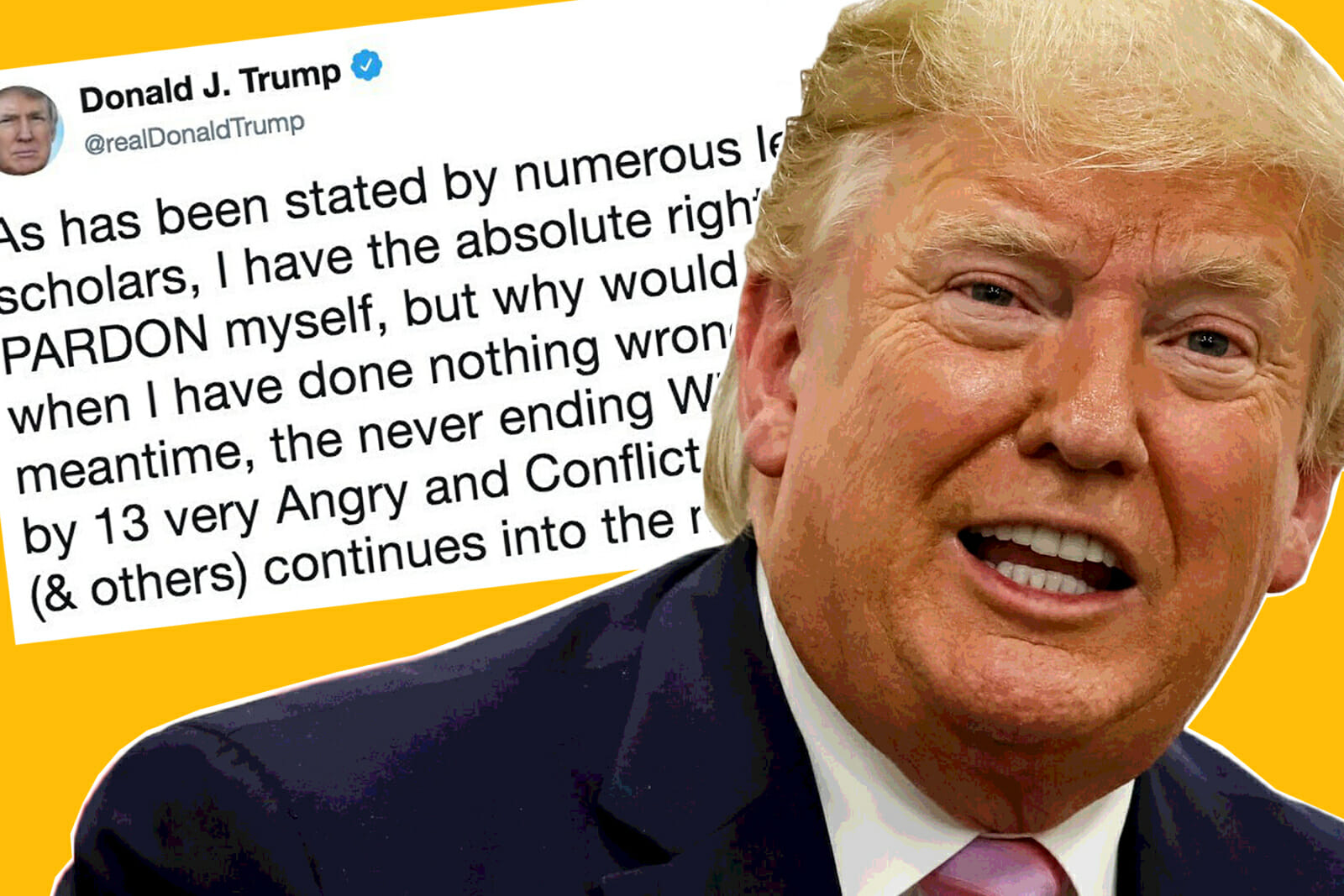
Can Donald Trump Pardon Himself?
When President Richard Nixon asked his justice department in 1974 whether a president could pardon himself, the department swiftly replied “no.” To elaborate, they stated that “no one may be a judge in his own case.” Three days later, Nixon resigned under the pressure of the Watergate scandal and likely impeachment. The presidency was then handed to Gerald Ford, who promptly pardoned Nixon of any federal crimes he may or may not have committed while in office.
Back in June of 2018, President Donald Trump caused quite a bit of confusion when he declared on his now suspended Twitter account that “I have the absolute right to PARDON myself.” As a result, millions of Americans began to ask themselves: “Can Donald Trump pardon himself?”
To begin, what is a pardon? A federal pardon in the United States is a government decision, made by the president, to allow a person to be relieved of some or all of the legal consequences resulting from a criminal conviction. Under the Constitution, only federal criminal convictions, such as those adjudicated in the United States District Courts, may be pardoned by the president. In addition, the president’s pardon power extends to convictions adjudicated in the Superior Court of the District of Columbia and military court-martial proceedings.
Under the Department’s rules governing petitions for executive clemency, 28 C.F.R. §§ 1.1 et seq., an applicant must satisfy a minimum waiting period of five years before he becomes eligible to apply for a presidential pardon of his federal conviction. Sorry Joe Exotic. Alternatively, if the conviction resulted in a sentence that did not include any form of confinement, including community or home confinement, the waiting period begins on the date of sentencing. However, it should be noted that, while rare, “pre-emptive” pardons have been used in the past, effectively ignoring the department regulations. The case of Nixon is a prime example of this.
Now, what does any of this information have to do with Donald Trump? Firstly, during December of 2020, Trump pardoned 41 individuals. In the previous 3, nearly 4, years of his presidency – he had only pardoned 29 individuals.
The majority of those pardoned in December have committed some form of mail, wire, or tax fraud (a certain harkening to Trump’s own ongoing issues). Secondly, the majority of pardons distributed to the initial 29 citizens have been to conservative political allies of Trump, who have broken the law. Examples being: Joe Arpaio, a former Arizona sheriff found in contempt after ignoring a court order to stop improper immigration roundups. As well as Retired Lt. Gen Michael Flynn, Trump’s former national security advisor, convicted of lying to the FBI about his contacts with Russia’s U.S. ambassador before Trump took office in 2017.
Lastly, in September of 2020, it was revealed that Donald J. Trump paid $750 in federal income taxes the year he won the presidency, and paid no income taxes at all in 10 of the previous 15 years. This is largely because he reported losing much more money than he made, despite flaunting a lavish and wealthy lifestyle. Trump’s dance of defiance in order to avoid speaking about his taxes has only stocked suspicion regarding the secrets that may lie within his tax returns. As a result, legal actions may or may not be taken further than the current state.
With that comes the final question: Can Trump pardon himself? The answer: maybe. There are so many elaborate political and legal nuances that come with this question. As a result, no true answer can be formed unless we come in contact with the situation. So, let’s go over some of the potential options and issues. If Donald Trump declares that he is going to pardon himself, a large degree of controversy is very likely to arise. In terms of checks and balances, the other two branches of government have little power to stop Trump. Congress and the Supreme Court do not have the power to directly block pardons or to challenge pardons that they see as unethical, inappropriate, or unjust.
As a back door, Congress could address the issue through impeachment. While Trump would no longer be president, by impeaching him, Congress could prevent his return to any form of public office. But as a practical matter, until Congress is truly confronted with the issue, the bipartisan nature of the question makes it difficult to reply to. However, it should be reiterated that a federal pardon only applies to federal offenses. Therefore, something like tax fraud would almost automatically also be a state offense and legally pursued despite the pardon. However, Trump’s fiscal failures could be considered a form of electoral fraud – as he purposefully deceived the public in order to obtain more votes. Electoral fraud is a federal offense and could therefore be pardoned.
One of the primary issues in the United States Constitution is the broad nature of many presidential powers. The pardon power happens to be one of the least limited and could be easily abused. While the Constitution states that the president can grant pardons, and granting typically means giving something to someone else, the word can nonetheless be manipulated. In several cases, the Constitution relies either on the ‘good’ character of the president or on political checks and balances to prevent massive abuses of power. In this highly polarized era, it is possible that in the case of Donald Trump – he could pardon himself without any major political backlash; social outrage is an entirely different story. It should also be noted that should Trump decree himself pardoned of any federal crime he may or may not have committed, the action in and of itself practically admits guilt. He would have no need to pardon himself unless a crime had taken place.
